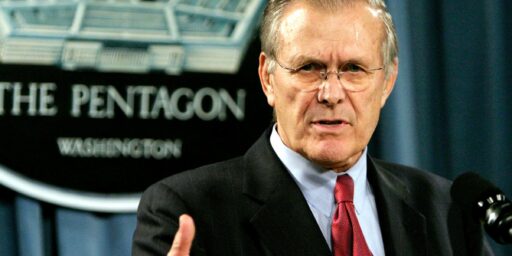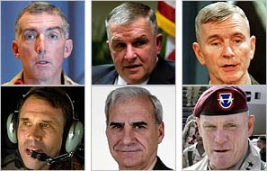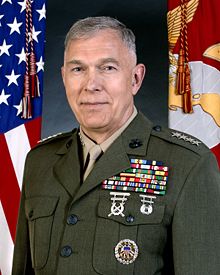BOOTS ON THE GROUND
Ralph Peters, a retired US Army intelligence officer, argues that air power alone is still not enough. This is certainly true. He overstates his criticism of Secretary Rumsfeld, however:
Rumsfeld and his key advisers have argued, ceaselessly, for cutting manpower in the Army in order to underwrite a blank check for the defense industry. Since he entered office, Rumsfeld’s staff has undercut the Army’s efforts to field more deployable medium-weight forces – of exactly the sort that would have been invaluable in this crisis – in order to force the Army into strategic “irrelevance.”
The new brigades the Army has fought to field could have been airlifted into Iraq or could have supplemented our hitting power as our forces crossed the Iraqi desert from Kuwait – if only those brigades had been given adequate support and funding.
In order to prove his contention that airpower is the single critical arm in 21st century warfare, Secretary Rumsfeld dismissed the advice of his generals over the past several months, delaying the deployment of Army divisions to the Gulf and limiting the number of ground forces finally deployed. He may win his gamble, but he has taken an unnecessary risk.
This is bizarre. Rumsfeld didn’t cancel any plans to build a medium-sized force. And, if such plans existed, they wouldn’t have yielded that force in the two years he’s been in office. The only significant Army program cut was the Crusader artillery system which, as a former artillery officer, I support. Indeed, anyone watching the war on TV can plainly see that our Army is hardly overmatched here.
As the campaign of shock-and-awe went on hold in the first days of the war and the Iraqis began to ignite oil fields while launching missiles into Kuwait, it was our ground forces from the Army, Marines and allied militaries who had to accelerate their plans and thrust into Iraq on an emergency basis.
Airpower is a magnificent tool. But you cannot stop sabotage from 25,000 feet. You cannot convince enemy military formations they are beaten until you demonstrate your presence on their soil. You cannot take prisoners, or protect refugees, or secure crucial facilities and resources from the air. And you certainly cannot stop genocide or ethnic cleansing from the sky.
Ground troops had to seize ports and oil infrastructure targets in Iraq. Tanks had to race across the desert to provide tangible evidence to the Iraqis that the Yanks really were coming.
Actually, in some cases, you can indeed do many of these things from the air. We have been protecting the refugees in northern and southern Iraq for a decade with no-fly zones; although we have also maintained an on-the-ground presence in the Kurdish region. But, even more importantly, the Army and Marines are certainly capable of doing those things right now; they are in fact doing them. They don’t need Crusader or any new toys to do those things.
The greatest problem, of course, is that, when the posturing in Congress is over, the individual soldier doesn’t have many friends on the Hill. But defense contractors, with their campaign contributions and promises of jobs in congressional districts, will always have plenty of elected supporters. And the defense industry always pushes for fewer troops and more expensive technologies.
Appropriate technologies are marvelous tools, but they still are not a substitute for well-trained, motivated troops.
We certainly need both. All indications are that we will continue to have both. Certainly, defense contractors have a lot of sway in Congress. But aside from that, the reason many military planners–including most of the brass–are so fond of spending their money on high-tech toys rather than troops is the long acquisition cycle.
I do agree–and have been arguing for over a decade–that, given the number of peacekeeping, post-war occupation, and other similar missions being undertaken, we need to rethink our force structure and, indeed, reallocate many of our existing Army resources for those missions, including moving more of our armor resources into the reserve component and increasing the ratio of military police, civil affairs, special operations, and language-skilled soldiers.




